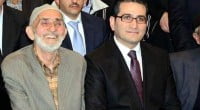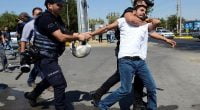Democracy on the rocks in Turkey

Date posted: July 21, 2016
MOHAMED NAWAB OSMAN
Last week’s military coup attempt in Turkey is likely to have a debilitating impact on Turkish democracy. Already, several thousand military officials and bureaucrats have been arrested. Even more perturbing, more than 2,000 judges were removed from their jobs. President Recep Tayyip Erdogan has squarely blamed the coup on the popular Hizmet movement, led by Turkish imam and philosopher Fethullah Gulen.
Since 2013, the Hizmet movement has been targeted by the Justice and Development Party (AKP)-led government after Mr Gulen spoke out against the alleged corruption of Mr Erdogan and his family.
The central tenet of the Gulen movement is the idea of moderation. Mr Gulen explains that this moderation stems from the unique experiences of the Turkish (Anatolian) Muslims, who had peacefully (and willingly) converted to Islam. The conversion occurred via the Turkic people of Central Asia, who had adapted Islam to their own culture, as opposed to Arab culture.
This Islam was heavily influenced by Sufism, Islam’s spiritual aspect that emphasises inclusivity and tolerance. Mr Gulen believes that “Turkish Islam” has much to offer the world, as it allows for the creation of a civic-minded, tolerant, peaceful and forward-looking “golden generation” of Muslims — a view that gained credence in the West particularly after the 9/11 attacks in the United States.
To achieve his aim, he encouraged his followers to start schools in Turkey and around the world that promote the highest educational standards with a strong focus on humanistic values. These schools have been recognised as important institutions that uplift educational standards in many parts of the world. In South-east Asia, these schools are among the top ones in Indonesia and Thailand. The success of the schools in Cambodia also led to the establishment of the Zaman University in Phnom Penh.
Another area of emphasis for Mr Gulen is dialogue and tolerance. In Turkey, he reached out to the Alevis, a minority Muslim sect long persecuted by the Turkish state, including the current government, for their “deviant” beliefs. In 2012, Mr Gulen, together with prominent Alevi elder Izzettin Dogan, initiated a project to build a mosque next to a cemevi (Alevi place of worship) to represent rapprochement between Sunni Muslims and Alevis. This came after the Turkish government announced that a third bridge to link the Asian and European sides of Istanbul would be named after the Ottoman Sultan Selim, known for his massacre of Alevis.
Internationally, Mr Gulen initiated meetings with leaders of the key faiths, including the late Pope John Paul II and former Chief Rabbi of Israel Eliyahu Bakshi Doron, to emphasise the need for inter-faith dialogue, respect and tolerance.
THE MOVE TO CRUSH HIZMET
Since the formation of the AKP, Mr Erdogan has sought the support of conservative Muslims in the country. Individuals within the Gulen movement supported the AKP with an understanding that the party would instil democratic norms in the country without pushing for an Islamist agenda. Mr Gulen himself is known for his opposition to Islamism. This understanding continued until 2013 when Mr Erdogan accused Mr Gulen of being behind corruption allegations that targeted senior supporters of the president, including his son Bilal Erdogan. Since then, the AKP government has moved to dismantle all institutions linked to the Hizmet movement.
The targeting of the Gulen movement is not surprising, given that Mr Erdogan has focused on consolidating his own power. The AKP government has made various constitutional amendments to weaken the military, presidency and bureaucracy, which act as bastions of Turkish secularism. While these moves received support from the Turkish populace, because of perceived discriminatory aspects of Turkish secular structure and policies, Mr Erdogan’s authoritarian tendencies began to come forth in 2013.
Following the Gezi uprising, a resistance that originally began as a protest against the tearing down of a park in Istanbul’s Taksim Square, Mr Erdogan silenced dissent by jailing an unprecedented number of journalists and shutting down social media sites such as Twitter. The divided Turkish opposition has also been unable to muster a credible challenge to Mr Erdogan.
It seems that the only institution that could pose a challenge to his leadership is the Hizmet movement. It was clear from the start that the AKP saw the Hizmet movement as a threat. An AKP politician explained in an interview the supposed alliance with Mr Gulen in the following terms: “When you are drowning (referring to the military establishment), you will hang on to a snake (analogy for Mr Gulen) to survive”.
The strong following that Mr Gülen enjoys in Turkey is estimated at more than 10 per cent of the Turkish population. Hizmet’s vast institutions both in Turkey and around the world are viewed by Mr Erdogan as a threat that should not be taken lightly. Hizmet’s international reputation can be seen from the failure of the Turkish authorities to close down schools run by the movement, despite their applying pressure on many governments to do so. The US government has also refused to extradite Mr Gulen, who is a resident in Pennsylvania, despite requests by the Turkish government.
To date, Mr Erdogan has failed to produce any evidence that Mr Gulen runs a parallel state structure that has infiltrated all major Turkish institutions. Likewise, no evidence has been presented that Mr Gulen engineered the attempted coup. This alleged threat of a state within a state, to remove all institutions linked to the Gulen movement in Turkey, is aimed at quashing any possible opposition to the government.
It will indeed be unfortunate if Turkey, once deemed a possible model for the Middle East and the rest of the Muslim world, is allowed to slide to an authoritarian system. Turkey’s democratic slide could encourage other regimes in the region to enhance their own authoritarian tendencies.
Most importantly, being a frontline state in the war against the Islamic State, instability in Turkey will have a negative impact on efforts to combat the threat posed by the terror group.
ABOUT THE AUTHOR:
Mohamed Nawab Osman is Assistant Professor at the S Rajaratnam School of International Studies and Coordinator of the School’s Seminar Series on Muslim Societies in Asia. He has published extensively on the Gulen movement in Southeast Asia. He recently completed an article on the Gulen Movement in Malaysia.
Source: Today Online , July 21, 2016
Tags: Defamation of Hizmet | Fethullah Gulen | Military coups in Turkey | Turkey |
























